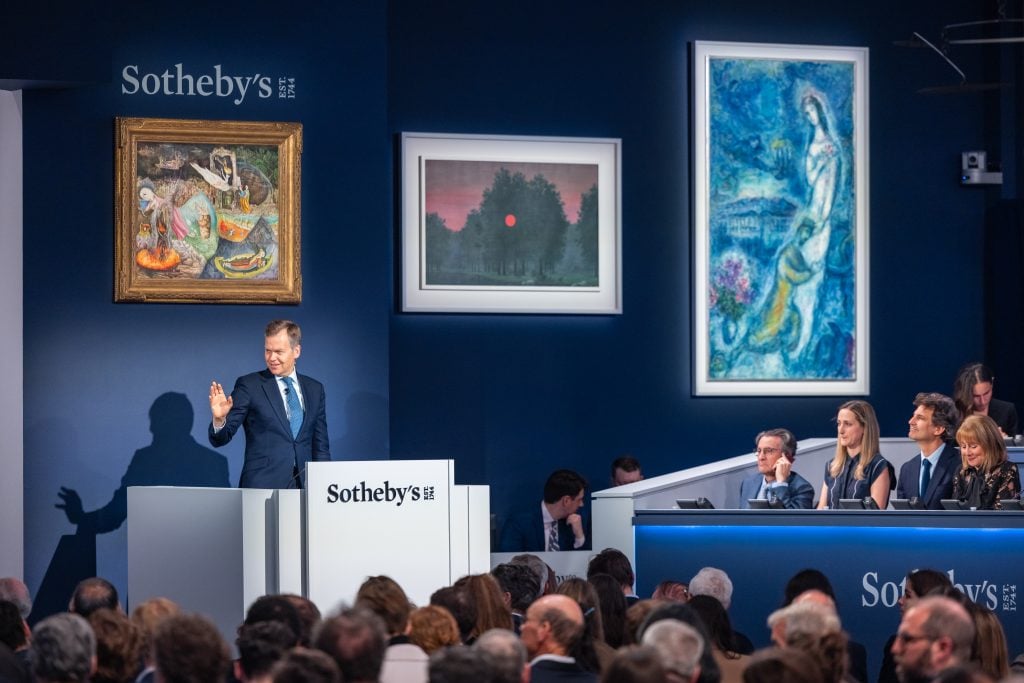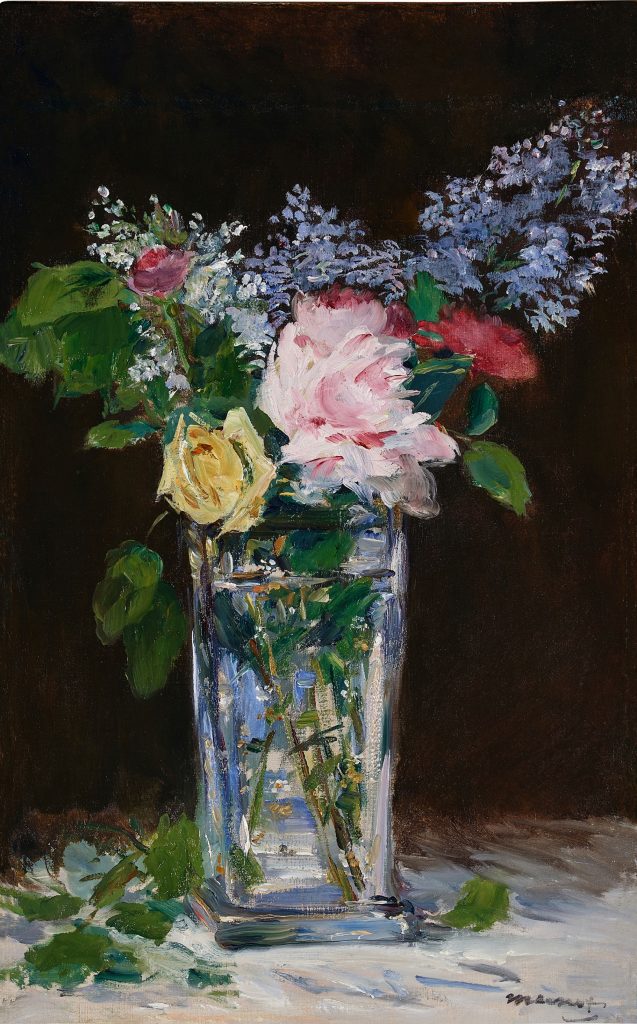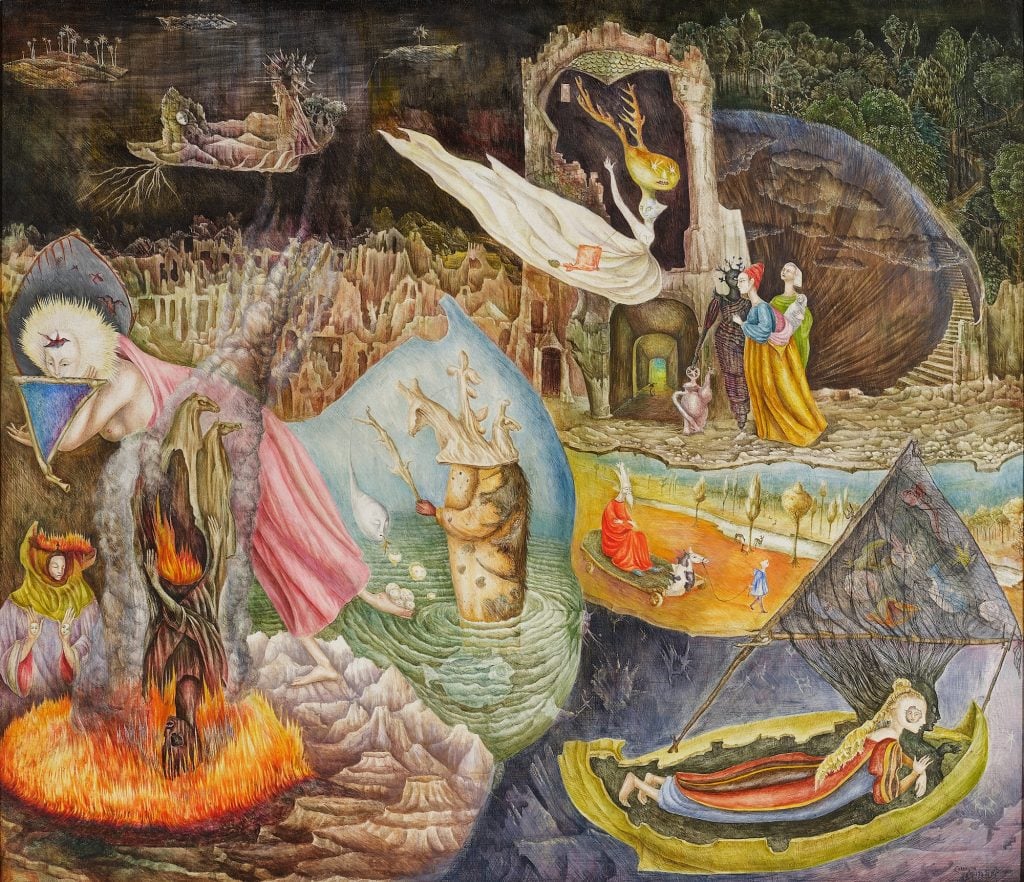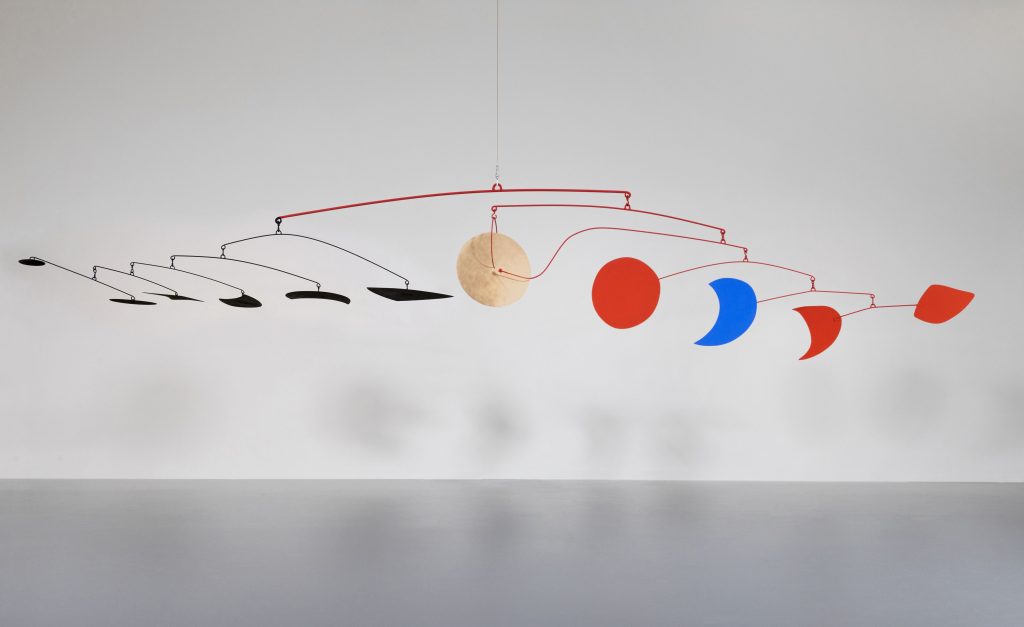Auctions
Monet Leads Sotheby’s $235 Million Modern Art Sale—But Carrington Steals the Show
The 10-minute bidding war for Carrington's surreal masterpiece injected much-needed excitement into an anxious auction season.

The 10-minute bidding war for Carrington's surreal masterpiece injected much-needed excitement into an anxious auction season.

Katya Kazakina

Leonora Carrington stole the show at Sotheby’s tonight, despite Claude Monet clinching the top bid.
Carrington’s Surrealist fantasy, Les Distractions de Dagobert (1945), soared to $28.5 million during the modern evening sale in New York.
The new personal high for the artist was astonishing on many levels. It obliterated her previous auction record of $3.3 million set just two years ago. It surpassed the surprisingly steep presale estimates of $12 million to $18 million. It propelled the British modernist into the highest echelon of the art market, ahead of legends like Salvador Dalí and Max Ernst, according to Sotheby’s. Finally, the 10-minute bidding battle for the phantasmagoric painting injected much-needed excitement into an anxious season.
Heading into the bellwether auctions amid a market contraction there was a lot of trepidation: Will the buyers be there? It seems that they are, especially for good-quality material tagged with attractive estimates.

Édouard Manet, Vase de fleurs, roses et lilas (1882). Photo courtesy of Sotheby’s.
Sotheby’s evening auction of modern art totaled $235 million, within the estimated range of $180.9 million and $250.7 million, but was down 22.5 percent compared to a similar auction a year ago. Two lots—by Georges Braque and Sam Francis—were withdrawn before the auction. Two of the remaining 50 lots failed to sell, producing a sell-through rate of 96 percent. The biggest casualty was Pablo Picasso’s Femme au chapeau (1939), estimated at $6 million to $8 million, which didn’t find a buyer.
The rest of the sale proceeded with businesslike efficiency. Sotheby’s mitigated the risk of the contracting market by lowering the estimates and the reserves whenever necessary. To win the material, Sotheby’s guaranteed much of the sale to consignors and then found investors to place irrevocable bids, ensuring that the works will sell. As a result, about two-thirds of the auction, both by value and by the number of lots, had been presold.
But despite this maneuvering, many lots seemed to spark genuinely deep bidding. One of the most active bidders was Jen Hua, Sotheby’s deputy chairman of Asia and chairman of China. She snapped up paintings by Renoir ($3.2 million), Monet ($34.8 million), Remedios Varo ($4.2 million), and Munch ($1.3 million). (Prices include Sotheby’s fees; estimates don’t.)

Leonora Carrington, Les Distractions de Dagobert (1945). Courtesy of Sotheby’s.
She also jumped into the bidding for Carrington at $20.8 million, to gasps from the audience, and remained in the three-way bidding war until the very end. She wasn’t meant to take home the trophy painting, however. That honor would belong to Argentine real estate developer Eduardo Costantini, who is known for paying record prices for Latin American art. (A Brit by birth, Carrington was among European Surrealists who moved to Mexico City during World War II.)
Seated in the front of the room next to his wife, Costantini bid relentlessly from the opening bid of $8.5 million to the final bid of $24.5 million. After fees were added, the final price was $28.5 million.
“I was the underbidder 30 years ago for this picture, and I didn’t want to miss it this time,” Costantini said, as he headed for the exit. Tonight’s anonymous seller outbid Costantini for the work back in 1995 at Sotheby’s, paying $475,500. (Adjusted for inflation, that’s about $990,000 today.)
“This was an exciting sale,” said Lisa Dennison, chairman of Sotheby’s in the Americas. “It had many disparate elements—Surrealist, modern, Impressionist—and they all performed well.”

Alexander Calder, Blue Moon (1962). Photo courtesy of Sotheby’s.
Mini bidding wars erupted till the final lots of the sale, comprised of lower-value works by Pierre Bonnard and Picasso. Early on, Alexander Calder’s large-scale mobile Blue Moon (1962) fetched $14.4 million, surpassing the high estimate of $10 million as it was pursued by six bidders. The result surprised some experts and drew applause from the room. “Late Calders used to be unsellable,” said Gregoire Billaut, Sotheby’s chairman of Contemporary art.
The top lot of the auction was Monet’s haystack painting, Meules à Giverny (1893), which hammered at $30 million (reaching $34.8 million after fees), compared to the $30 million estimate. Bidding for that lot was odd, dealers pointed out. After quickly reaching $28.5 million, the bidding proceeded in fits and starts for almost eight minutes, only to move up by $1.5 million. Hua ended up winning the work.

Claude Monet, Meules à Giverny (1893). Photo courtesy of Sotheby’s.
An exquisite still life by Édouard Manet, Vase de fleurs, roses et lilas (1882), fetched $10.1 million. Its seller was collector Greg Renker, a cofounder of Guthy-Renker, a direct-marketing company of beauty and health products, according to people familiar with his collection. Renker was also the anonymous consignor of a quartet of Joan Mitchell paintings at Sotheby’s on May 13.
Reduced estimates generated bidding from all around the world, Sotheby’s said. There were plenty of opportunities, according to Hong Gyu Shin, an art dealer and collector in New York. After losing in the bidding war for László Moholy-Nagy’s CH For R1, Space Modulator, Scene from My Lightplay (1942), Shin went for Van Gogh’s Head of a Peasant (1885), estimated at $1.5 million to $2.5 million, and ended up getting it for half that: $787,400. It’s the first Van Gogh in his collection and he plans to hang it in his bedroom next to a work by Vilhelm Hammershoi.
“It was a spontaneous purchase,” Shin said about the Van Gogh after the auction. “It was a no-brainer.”